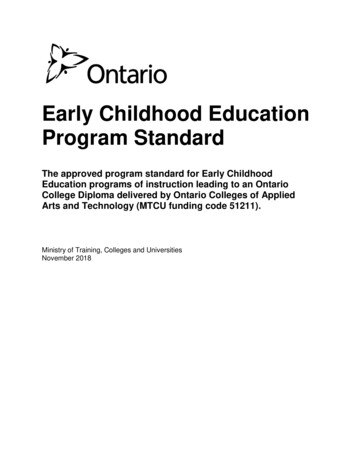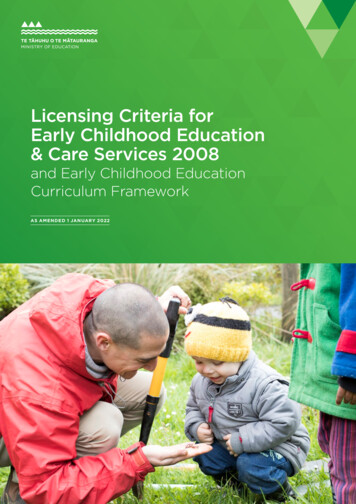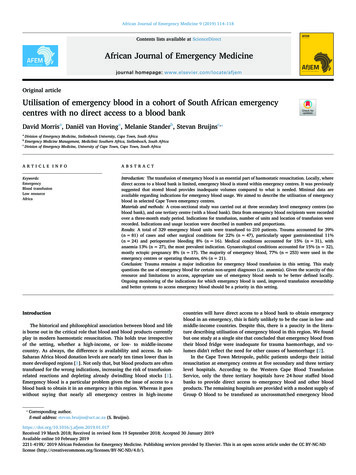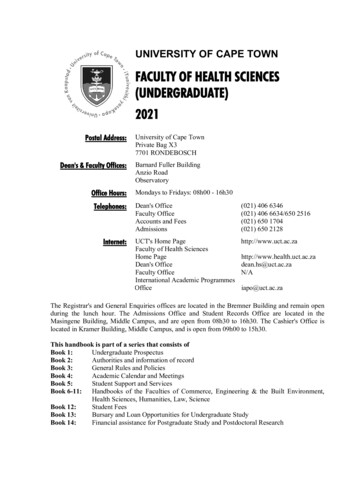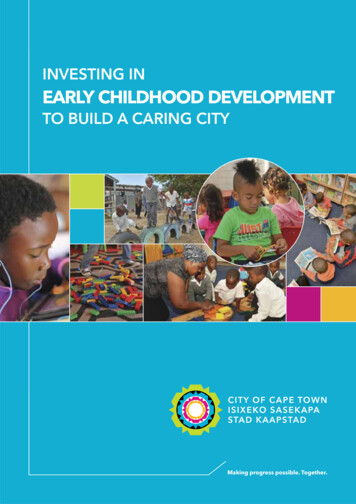
Transcription
INVESTING INEARLY CHILDHOOD DEVELOPMENTTO BUILD A CARING CITYMaking progress possible. Together.
Document navigation shortcuts Entries on the Contents pages link to the relevant page. The tabs on the right-hand pages link to the first page of the relevant section. The document title in the footer of each page links to the first Contents page.
“EDUCATIONIS THE MOSTPOWERFUL WEAPONYOU CAN USE TOCHANGE THE WORLD.”NELSON MANDELACITY OF CAPE TOWNSOCIAL DEVELOPMENT AND EARLY CHILDHOOD DEVELOPMENT DIRECTORATE
FOREWORDWe have a duty to provide Cape Town’s young children, in particular those foundin the low socio-economic index, with the best possible start to their formativedevelopment so that they can unlock their full potential and rise above theircircumstances. During the first six years in a child’s development they acquire concepts, skillsand attitudes that lay the foundation for lifelong learning. This period is the most critical,when they require the most care and support as they experience rapid physical, mental,emotional, social and moral growth.For this reason the City is making a massive investment in early childhood development(ECD) by building ECD centres of excellence. Besides being facilities for children, they couldinclude space for ECD capacity building training and vegetable gardens, as well as cater fora toy library component.It forms part of our goal of getting to the point where every child has access to a facilitythat can provide the building blocks so crucial to their future. The importance of well-functioning ECD centres cannot be overstated as part of this administration’s efforts to build a caring city and an opportunity city. A child who receives the right kind of stimulation in theirearly developmental years will no doubt cope better when they enter the formal educationsystem and so it is important that we do everything in our power to ensure that our ECD centres are able to fulfil this very crucial role in the lives of our children.In addition, the City is very aware of the many challenges that ECD operators face in becoming compliant. For this reason, a number of measures were put in place to try to assistthem. It is in our best interests to help as many ECDs as possible become compliant, becauseultimately it will benefit the children who attend these centres. As part of its 2014/15 financialyear, the SDECD Directorate has committed a budget of R1,9 million to skills developmentprojects and programmes that are aimed at building the capacity of ECD practitioners. Thisallocation has enabled the directorate to implement the following projects: Accredited First Aid level 1 training, which reached 164 ECD practitioners and includedthe provision of first aid kits to 135 ECD centres. The provision of toys and educational toolkits to support 93 ECD centres in upgrading theircurriculum programmes. 11 ECD centres for children with disabilities benefited through the provision of stimulationkits to support their educational development.As part of a strategic focus to empower community ECD forums towards ensuring theireffectiveness and sustainability, the directorate also allocated training opportunities acrossvarious organisational development skills to 23 community-based ECD forums.ECD registration is extremely crucial, because it means that the operator is compliant withthe various laws and regulations governing childcare, but it also means that they can apply forsubsidies to the provincial department of Social Development and build an even better platformfor the development and growth of the children in their care. It also provides peace of mind forthe thousands of parents who rely heavily on childcare facilities while they are at work.COUNCILLOR SUZETTE LITTLEMember of the Mayoral Committee for Social Development and Early ChildhoodDevelopment (SDECD)2INVESTING IN EARLY CHILDHOOD DEVELOPMENT, CITY OF CAPE TOWN 2015
INVESTING INEARLY CHILDHOOD DEVELOPMENTTO BUILD A CARING CITYThe Early Childhood Development (ECD) period is when cognitive stimulation,nutrition and emotional attachment all work together to shape the identity, copingskills, intelligence and problem-solving abilities that children will need to grow intowell-adjusted adolescents and adults.The City of Cape Town takes this development period very seriously and realises that it isimperative to support our young citizens early on in order for them to become well-rounded,active and involved residents of our City, and our country. It is also a very important tool toempower people to rise above poverty and other social ills that are prevalent within many ofour communities.By providing good ECD services and support, we also adhere to the requirements set forthin the Children’s Act for a child’s holistic development.Various challenges in terms of infrastructure, resources and training – our three main focuspoints – have given the City the opportunity to provide ongoing support to the ECD sector inorder to reach levels of compliance with regards to educational, health and safety requirements.With regard to training, expansion and awareness, the City has been running programmesaround raising awareness, organisational development, entrepreneurial training and development, the improvement of child safety, provision for wellness and nutrition needs, the improvement of practice standards, and training and raising awareness around the needs ofchildren with disabilities or special-care requirements, such as those suffering from foetal alcohol syndrome and HIV/Aids.The City strives to manage, develop, coordinate and report on implementation of its programmes, projects and interventions relating to the ECD Department by planning, designing,monitoring and evaluating programmes via project management methodologies. In addition,they activate ECD registration support by managing relationships with identified external stakeholders (NGOs and service providers) as well as collaborations with Western Cape Government.During the 2014/15 financial year, the relationship between the City of Cape Town andprovincial government gained momentum with the launch of joint ECD registration drives.These are aimed at imparting registration information to ECD practitioners and stakeholdersat community level. Various City of Cape Town and Provincial Department of Social Development officials engage with ECD stakeholders in communities and take them through a stepby-step guide on registration procedures and associated statutory requirements. These jointECD registration drives reached more than 600 ECD practitioners, who all expressed greatappreciation for this opportunity. It is important to note that through this initiative betweenthe two spheres of government, 184 ECD centres were registered and more are expected togain their registration status based on the applications received into the system.Members of the SDECD Portfolio Committee played a very important role during the implementation of the joint ECD registration drives by encouraging participation by communitystakeholders and identifying unregistered ECD centres within their wards for site inspectionsso that they could receive expert advice on registration compliance. Through the committee’soversight role, its members were able to monitor the implementation of Council’s IDP, budget,business plans, strategic objectives, policies and programmes in relation to early childhooddevelopment.The theme of the ECD registration drive is: “To invest in early childhood development tobuild a caring city”, and this demonstrates the administration’s commitment to deliver to theECD sector and to build on the future of the lives of the children in the City of Cape Town.COUNCILLOR RAELENE ARENDSEChairperson of the Social Development and Early Childhood Development (SDECD)Portfolio Committee3INVESTING IN EARLY CHILDHOOD DEVELOPMENT, CITY OF CAPE TOWN 2015
CONTENTSFOREWORD Councillor Suzette Little, Member of the Mayoral Committee for Social Development and EarlyChildhood Development (SDECD) . 2INVESTING IN EARLY CHILDHOOD DEVELOPMENT TO BUILD A CARING CITY Councillor Raelene Arendse,Chairperson of the Social Development and Early Childhood Development (SDECD) Portfolio Committee . 3GLOSSARY OF TERMS . 6LIST OF FIGURES AND TABLES . 6INTRODUCTION . 7PART A: ABOUT EARLY CHILDHOOD DEVELOPMENT . 91234THE IMPORTANCE OF EARLY CHILDHOOD DEVELOPMENT . 10ECD SERVICES IN SOUTH AFRICA .The national context .The Constitution (Section 28) and Bill of Rights .The South African Bill of Rights .The Children’s Act .The Provincial context .Reporting of an abused or neglected child and a child in need of care and protection .National Child Protection Register .Part A of the register .Part B of the register .Finding persons unsuitable to work with children .1213131314161616161616THE LOCAL CONTEXT: THE MANDATE OF THE CITY OF CAPE TOWN . 18The City’s Social Development Strategy . 18Electronic registration . 20ECD IN THE CITY OF CAPE TOWN .Setting a shining example of ECD service delivery at subcouncil level .The City of Cape Town Rates Policy .The City ECD programme’s basket of services .ECD Centres of Excellence .Mfuleni ECD Centre .Leonsdale ECD Centre .Sing for Africa ECD Centre .ECD centres operating from Council facilities and managed by the Social Development and ECD Directorate. .ECD forums .ECD forums in the Cape Metro .Key ECD service providers .The ECD forums’ development training initiative .The ECD educational toolkit .The ECD stimulation toolkit for children with disabilities .The ECD site learning programme .The City’s toy library initiative .Accredited first aid training .Expanded Public Works Programme .ECD centres survey G IN EARLY CHILDHOOD DEVELOPMENT, CITY OF CAPE TOWN 2015
A31313232323232ABOUT EARLY CHILDHOOD DEVELOPMENTECD cleaning project .ECD community outreach .Private/public partnerships .ECD investigative report .Cipla Foundation .Construction of the Fisantekraal ECD Centre .Department of Social Development, Western Cape Government .PART B: ABOUT REGISTRATION, REQUIREMENTS AND PROCEDURES . 352345678REGISTRATION PROCEDURES FOR PARTIAL CARE FACILITIES PROVIDING EARLY CHILDHOODDEVELOPMENT AND AFTER-SCHOOL CARE SERVICES .The role of the local authority or municipality .Documents required for an ECD application .Site visits and inspections .Requirements for re-registration .3737373737DAILY PROGRAMMES . 38Menus and food . 38Health and safety . 38Transport of children . 39Day-to-day management of the project . 39Staff-to-child ratios .39THE ECD MANAGEMENT COMMITTEE . 40Regular meetings . 40Reports .40Understanding effective governance . 40Recognising effective governance .40Financial administration . 41The audit process .41GENERAL TIPS .Tips for parents .Tips for service providers .Tips for communities .BABOUT REGISTRATION, REQUIREMENTS AND PROCEDURES142424242CHILDREN'S DEVELOPMENTAL STAGES: ECD PRACTITIONERS’ QUALIFICATIONS MAP . 43NATIONAL NORMS AND STANDARDS . 44National norms and standards for partial care . 44National norms and standards for early childhood development programmes . 47IMPORTANT FORMS REQUIRED . 49CONTACT DETAILS .The City of Cape Town early childhood development interdepartmental (ECD) task team .The City of Cape Town Social Development and Early Childhood Development district offices .The Department of Social Development (of the Western Cape Government) .50505051BIBLIOGRAPHY . 525INVESTING IN EARLY CHILDHOOD DEVELOPMENT, CITY OF CAPE TOWN 2015
GLOSSARY OF DECDSDSannual general meetingChild Support GrantDepartment of Social Development (of tge Provincial Government of the Western Cape)early childhood developmentEconomic Growth StrategyExpanded Public Works ProgrammeFoundation for Community WorkIntegrated Development PlanMember of the Executive CouncilMemorandum of UnderstandingNational Building RegulationsPlanning and Building Development Managementparent-teacher associationsite cleaning programmeSocial Development and Early Childhood DevelopmentSocial Development StrategyAn ECD centre is any building or premises maintained or used for the care of children. It includes a playgroup, crèche,aftercare centre, preschool and nursery school or similar.Social development is understood broadly as the overall improvement and enhancement in the quality of life of allpeople, especially those people who are poor or marginalised. At its core is a focus on addressing poverty, inequalityand social ills while providing for the participation of people in their own development.Stunting or stunted growth occurs when a child does not grow normally and is smaller than children of the sameage. This is caused by malnutrition and recurrent infections, such as diarrhoea and worm infections. It can also becaused during pregnancy, when the mother is not eating enough and goes hungry regularly.LIST OF FIGURES AND TABLESFIGURESFigure 1: ECD registration service application process flow . 20Figure 2: Registered and unregistered early childhood development (ECD) centres in the City of Cape Town . 22TABLESTable 1: ECD Centres operating from Council facilities and managed by Social Development and ECD Directorate.Table 2: ECD Forums in the Cape metro .Table 3: Early childhoodd development practionioners’ qualifications map .Table 4: The City of Cape Town Early Childood Development (ECD) task team (contact details) .Table 5: The City of Cape Town Social Development and Early Childhood Development District Offices(contact details) .Table 6: The Department of Social Services (of the Provincial Government of the Western Cape)(contact details) .2526435050516INVESTING IN EARLY CHILDHOOD DEVELOPMENT, CITY OF CAPE TOWN 2015
AINTRODUCTIONTABOUT EARLY CHILDHOOD DEVELOPMENThe City of Cape Town is immensely proud to introduce an information booklet that showcases the work it hasundertaken to support the National Development Plan (NDP) objectives to invest in early childhood development(ECD). In pursuance of achieving the NDP goals and sharing best practice, the City hopes this ECD booklet will motivatevarious community stakeholders and the private sector to rededicate themselves to harnessing our combined efforts to keepimproving the quality of ECD services in the Cape Metro.This booklet is intended to highlight some of the initiatives that the City has implemented and also to become a resourcefor the ECD sector on matters of statutory registration.It is dedicated to all those who have heeded the call to work in partnership with the City to elevate the strategic importanceof ECD in contributing to sustainable economic growth and social stability in South Africa and the Cape metro in particular.AcknowledgementsA special word of gratitude and appreciation to everybody who contributed to compiling this publication. Various interviewsand documents provided information and case studies in the ECD field within the boundaries of service delivery of the Cityof Cape Town.ANDILE WOTSHELAECD Manager: Social Development andEarly Childhood Development DirectorateERNEST SASSActing Executive Director: Social Developmentand Early Childhood Development DirectorateABOUT REGISTRATION, REQUIREMENTS AND PROCEDURESB7INVESTING IN EARLY CHILDHOOD DEVELOPMENT, CITY OF CAPE TOWN 2015
8
AABOUT EARLY CHILDHOOD DEVELOPMENTPART A1. The importance of early childhooddevelopment2. ECD services in South Africa3. The local context:The mandate of the City of Cape Town4. ECD in the City of Cape TownABOUT REGISTRATION, REQUIREMENTS AND PROCEDURESB9INVESTING IN EARLY CHILDHOOD DEVELOPMENT, CITY OF CAPE TOWN 2015
1. THE IMPORTANCE OF ECDTHE IMPORTANCE OFEARLY CHILDHOOD DEVELOPMENTEResearch shows thataccess to good ECDservices during the firstyears of a child’s life isone of the mostpromising approaches toalleviating poverty andachieving social andeconomic equity.arly childhood development (ECD) refers to the development of children from birth to about six years of age. Theterm is recognised internationally and includes various aspects of a young child’s development, such as nutrition,health, living environment, supportive parenting, cognitive stimulation and, if necessary, access to health care, socialservices and social assistance.The United Nations Convention on the Rights of the Child states that young children have a right to develop to their fullpotential by growing up in a healthy, safe and stimulating environment.The South African government supports this view and a lot of resources have been spent on young children – for instance,concentrating on enrolling young ones in Grade R, the first year of a child’s formal schooling. However, research shows thataccess to good ECD services during the first years of a child’s life is one of the most promising approaches to alleviatingpoverty and achieving social and economic equity. The first years of life, and especially the first 1 000 days from conceptionto two years of age, are a particularly sensitive period for brain development. After this, brain development slows and buildson the base already acquired. Where the environment is not favourable to development, the deficits become more difficultand costly to address as children get older. Without intervention, the child will fall more and more behind. In order to developto their full potential children need good nutrition, good health, a healthy living environment, supportive parenting, cognitivestimulation and, if necessary, access to health care, social services and social assistance.Factors such as malnutrition, poor health, home environments lacking in stimulation and encouragement for learning,and harsh discipline have a negative impact on children’s development. Children living in households faced with significantcaregiving burdens and poor access to resources, services and education are particularly at risk. In households with greaterincome, children usually benefit from better home circumstances (safer environments, better nutrition, and more stimulationof the kind that encourages exploration and learning and that prepares them for formal schooling). They also have betteraccess to ECD services beyond the home, such as crèches and preschools, often through privately run schemes.Failure to provide services to poor children, whose development may be compromised already by poverty, represents adouble failure to address inequality.ECD services have been shown to: improve physical and mental health, and reduce reliance on the health system; enhance school readiness and related outcomes such as improved enrolment, retention and academic performance; and reduce high-risk behaviours like unsafe sex, substance abuse, and criminal and violent activity.Arguments for ECD as a human capital development and cost-saving measure are a compelling motivation for publicinvestment, but there is also a strong rights-based argument for improving access to good ECD services. ECD also promotessocial fairness by giving disadvantaged and vulnerable children a better start to life. For all these reasons investment in ECDis neither a luxury nor a privilege – it is a key responsibility of government.Over the last two decades, national government has worked very hard to enrol preschoolers in Grade R. This year is veryimportant to help children adjust to the formal schooling system (Grades 1–12). Government’s ECD services are focused on0–4 year olds. This includes: birth registration; health promotion during pregnancy, birth and early childhood; nutrition; psycho-social support services; referrals to health and social services (including social grants); and early learning stimulation.10INVESTING IN EARLY CHILDHOOD DEVELOPMENT, CITY OF CAPE TOWN 2015
1. THE IMPORTANCE OF ECDABOUT EARLY CHILDHOOD DEVELOPMENTAThe importance of a healthy, balanced diet has been proven repeatedly – especially for growing children. If a child doesnot get the necessary nourishment, it can lead to stunted growth, where their physical development is behind that ofthe rest of their age group. These children often also weigh significantly less than their friends of the same age. It hasbeen pr
EDUCATION IS THE MOST POWERFUL WEAPON YOU CAN USE TO . Chairperson of the Social Development and Early Childhood Development (SDECD) Portfolio Committee. INVESTING IN EARLY CHILDHOOD DEVELOPMENT, CITY OF CAPE TOWN 2015 CONTENTS FOREWORD Councillor Suzette Little, Member of the Mayoral Committee for Social Development and Early .
